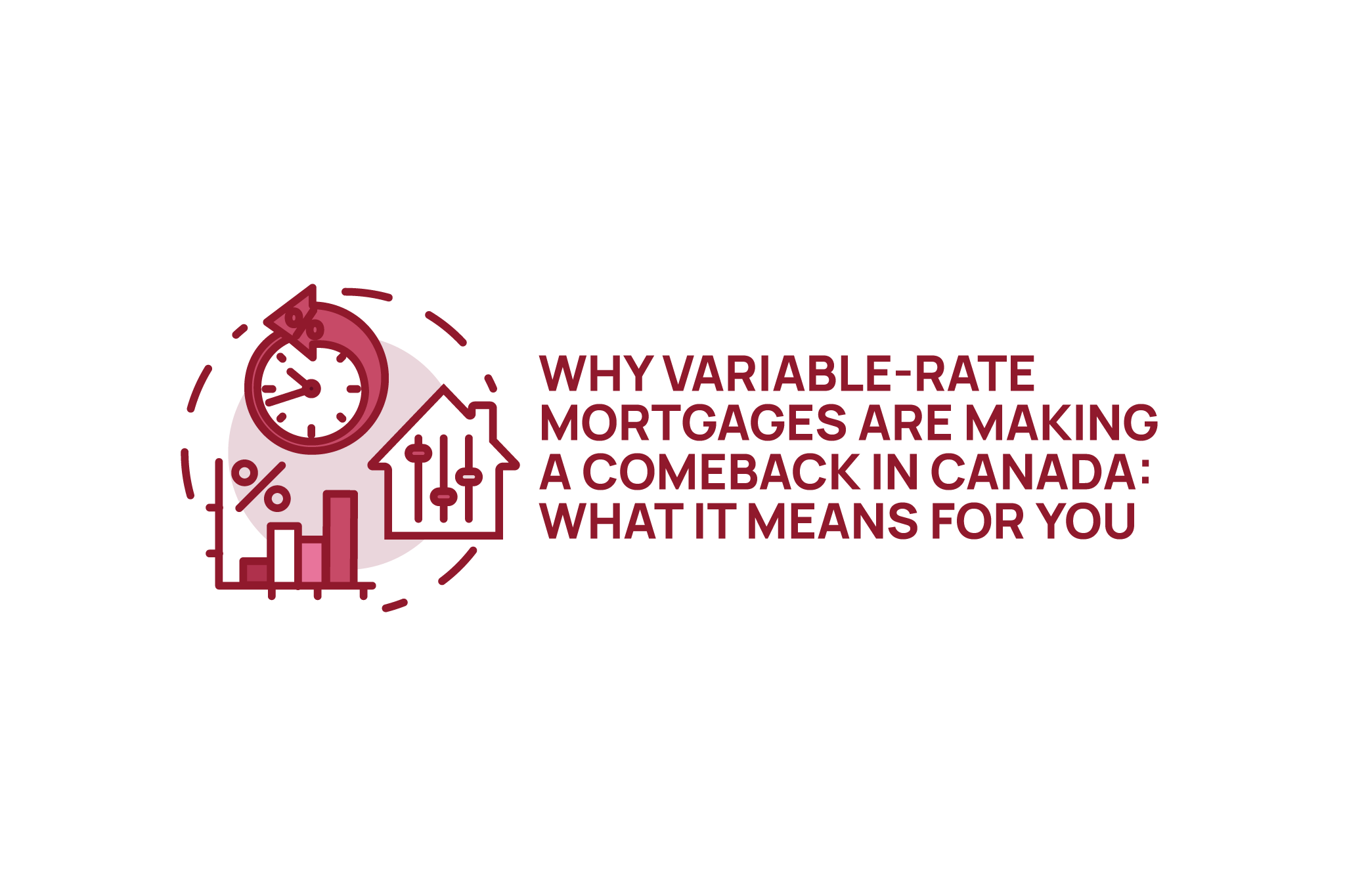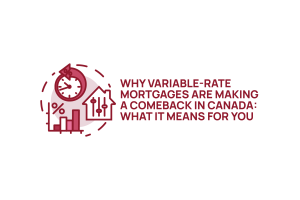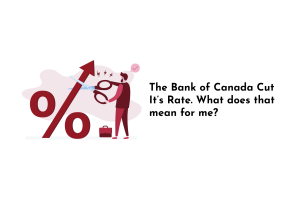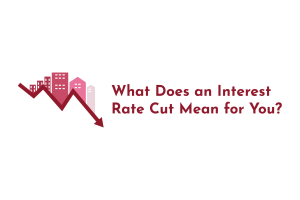Are you a homeowner considering refinancing a mortgage in Muskoka, Ontario? If yes, you must have noticed some recent buzz regarding variable-rate mortgages. Since the Bank of Canada slashed its prime rates from 3.25% to 3% in January 2025, Canadians have been rethinking their mortgage strategies. The big question on everyone’s mind is:
“Should I stick with fixed-rate mortgages, or is it time to try out variable-rate mortgages?”
In today’s guide, we’ll break down what a variable-rate mortgage is all about, explore its benefits and downsides, and ultimately help you decide if it might just be the right fit for your financial journey. Keep reading to learn more!
What Is a Variable-Rate Mortgage?
A variable-rate mortgage is a home loan whose interest rates change with economic conditions. To help you understand this term better, picture it like a ride-share fare during rush hour. Prices fluctuate based on demand, traffic, and weather.
Similarly, when economic conditions are favorable, and the Bank of Canada lowers prime rates, your mortgage rate falls, saving you money on monthly payments. Conversely, if rates rise, your borrowing cost will equally increase.
This approach differs significantly from the traditional fixed-rate mortgage, whereby rates are constant throughout your payment term regardless of the economic situation or increasing prime rates.
Why Are Variable-Rate Mortgages Gaining Popularity?
Economic policies force borrowers to reexamine their financial strategies every year. What looked like a solid strategy last year now seems a bit risky.
And here’s an interesting twist: over 1.2 million Canadians are facing a mortgage renewal in 2025. That means several individuals could reexamine their options as the renewal day approaches. As such, they may want to switch to variable-rate mortgages. Here are a few factors responsible for this.
- Rate Cuts Are Here (And More Could Follow)
Over the years, the Bank of Canada has initiated a series of interest rate cuts to stimulate economic growth. A recent decision was made to reduce the policy rates by 25 basis points (or 0.25%) to 3% in January 2025 from 3.25%. While that reduction might look small, it can make quite the difference on a sizeable mortgage.
For example, this modest drop in the interest rate on a CA$500,000 mortgage could save an Ontario homeowner roughly CA$104 a month or CA$1,250 annually (500,000 × 0.25%). Interestingly, there is mounting pressure for the Bank of Canada to keep cutting interest rates, which would benefit homeowners in the long term.
- Flexibility in an Evolving Market
Another reason for the increasing interest in variable-rate mortgages is their flexibility. When you’re dealing with fixed-rate mortgages, you’re locked into one payment rate for your entire contract. Variable rates, on the other hand, shift with the market conditions. As such, you can benefit from any drop in interest rates.
And what if the tide turns and rates start climbing unexpectedly? You can switch from variable mortgage rates to a fixed one. Many Canadian lenders offer this option without homeowners incurring additional fees.
- A Return to Historical Norms
Before the disruptions of the COVID-19 pandemic, variable-rate mortgages were popular for many Canadian homeowners. Historical data revealed that over a long period, borrowers leveraging this approach paid less than those on fixed-rate loans.
With the market conditions starting to stabilize, more Canadian homeowners are revisiting this tried-and-true strategy.
Overall, the combination of rate cuts, market flexibility, and a return to historical borrowing trends is sparking renewed interest in variable-rate mortgages in Muskoka, Ontario. It’s an exciting time to explore your options and potentially unlock savings for the future.
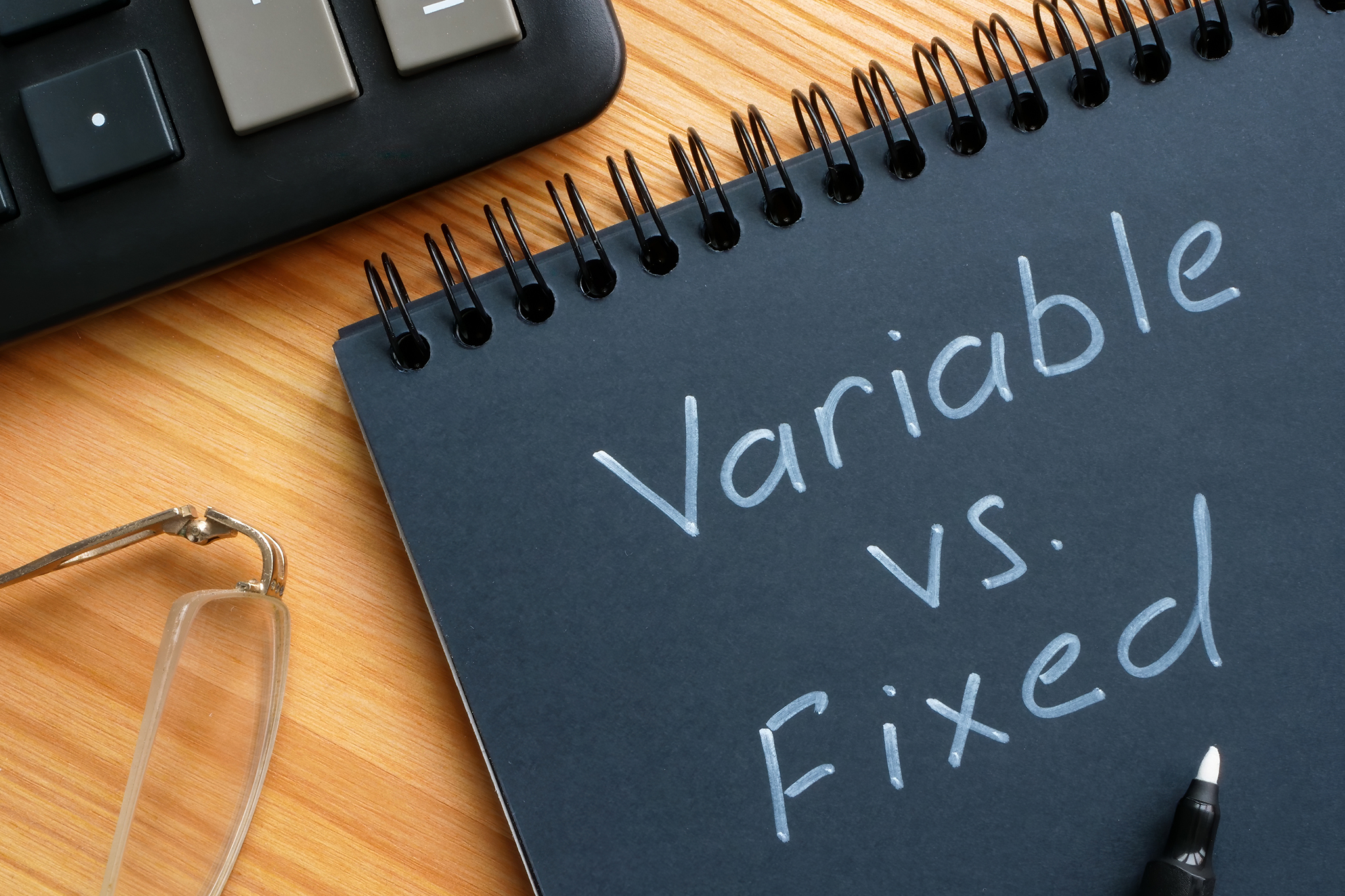
Fixed vs. Variable Mortgage: Discerning Their Differences
Choosing the right mortgage is a key decision, especially with so many of the best mortgage options for homebuyers in 2025. The debate regarding fixed vs. variable mortgages is at the forefront of these decisions, each with its distinct advantages and trade-offs.
A fixed-rate mortgage locks in an interest rate for the entire term, ensuring your monthly payments remain consistent. As we’ve explained so far, variable-rate mortgage fluctuates with market conditions. That means your interest rate and monthly payments can change over time.
The table below provides a clear side-by-side comparison of the two:
| Feature | Fixed-Rate Mortgage | Variable-Rate Mortgage |
| Interest Rate Stability | The rate remains constant throughout your term, providing a predictable borrowing cost. | It fluctuates with the market, which means it can decrease (or increase) over time. |
| Benefit from Rate Reductions | You won’t directly benefit from lower rates unless you refinance, which may come with steep penalties. | If rates fall, your loan rates drop accordingly, leading to immediate savings on your monthly payments. |
| Flexibility to Adjust | Limited flexibility; you’re locked into one rate for the entire term. | Many variable-rate mortgages allow you to switch to a fixed rate without high fees if market conditions change, giving you the best of both worlds. |
| Early Exit Penalties | Often includes hefty penalties if you break your mortgage early. | Typically, it carries a much lower penalty, usually around three months’ interest. |
| Ideal For | Borrowers who value consistent, predictable payments and want a straightforward budgeting experience. | Homeowners comfortable with some market risk who want to potentially benefit from falling rates and enjoy greater flexible mortgage rates in Muskoka. |
3 Benefits of Choosing a Variable-Rate Mortgage?
A variable mortgage rate seems like the next best thing for any homeowner right now. Here are three advantages it offers.
- Immediate Interest Savings
When the Bank of Canada lowers its rates, your mortgage rate falls. This translates to immediate monthly savings. Even a half-percent reduction, though modest, can free up cash that you could allocate to home improvements or that overdue family vacation.
- Flexibility of Switching From Variable To Fixed Rates
When applying for a mortgage in Canada, most lenders offer the option to switch from a variable to a fixed rate at any time without incurring extra charges. This “switchability” is invaluable, especially if market conditions shift suddenly.
If there’s a possible rise in interest rate in the next month or quarter, you can switch to a fixed rate to ensure your monthly payments remain “fixed.”
- Variable Rates Result in Historical Savings Over Time
Over a lengthy period, variable-rate mortgages have historically resulted in lower overall interest costs than their fixed-rate counterparts. Even if interest rates rise, the cumulative payment of lower rates during extended periods of economic easing is quite significant.
Risks of Opting for a Variable-Rate Mortgage
Of course, no financial product is without its share of downsides. Variable-rate mortgages can help you save more, but here are some of its drawbacks:
- Payment Fluctuations
The nature of variable rates (as the name suggests) means your periodic payments can vary. For example, if rates rise by 0.5% on a CA$600,000 mortgage, your interest could increase by CA$150 monthly.
The exact increase will depend on your loan term and amortization schedule. This fluctuation could cause financial stress if your household lives on a tight budget or fixed income.
- Homeowners May Face Budgeting Challenges
Every Canadian homeowner loves it when their personal finance is predictable. With a fixed-rate mortgage, you know exactly what you’re paying every month — budgeting becomes easier.
In contrast, a variable-rate mortgage, which fluctuates based on the Bank of Canada’s prime rates, introduces uncertainty. This makes long-term financial planning more difficult, as you can’t be sure how much your mortgage payments will increase in the future.
- The Uncertainties of a Rising Market
Many economic experts are optimistic about more prime rate cuts in Canada. But just like what happened during the 2020 global pandemic, the economic landscape can change in the blink of an eye. If such happens and rates rise, you should expect higher loan repayments.
However, this approach remains a smart bet if you are comfortable with the uncertainties and have the financial resilience to absorb future rate increments.

Who Should Consider a Variable-Rate Mortgage?
Variable-rate mortgages, despite their benefits, aren’t a one-size-fits-all solution. They work best for certain types of individuals, such as:
- Risk-Tolerant Homeowners
Variable-rate mortgages are ideal for individuals who view shifting rates as an opportunity rather than a threat. These borrowers are willing to accept short-term uncertainty for potential long-term savings. As such, they have stable incomes and a healthy emergency fund to cushion occasional prime rate hikes.
- Long-Term Homeowners
Variable-rate mortgages are also excellent for those who plan to stay longer in their homes, thus benefiting from their cumulative savings. Whether considering a family home or seasonal retreat in Muskoka, this option works best for such individuals.
- Borrowers Anticipating Life Changes or Refinancing
Variable-rate mortgages are also excellent for anyone planning to sell their homes, refinance, or make significant life changes in a few years. This option is more fitting since lower penalties are imposed for breaking the mortgage early.
Navigating Penalties and Flexibility of Variable-Rate Mortgages
When you consider variable mortgage rates in Muskoka, one key attraction would be the lower penalty incurred when breaking your payment terms. What do we mean?
With fixed-rate mortgages, if you decide to exit your payment term early, you face an Interest Rate Differential (IRD) penalty that could burn quite a hole in your pocket. In contrast, most variable-rate mortgages only charge three month’s interest if you break your term early.
But here’s the catch: the way banks calculate IRD can cost you thousands extra. Big banks often use a higher prime rate (like the Bank of Canada’s) instead of actual market rates. That inflates your penalty.
This is where working with a broker pays off. Brokers connect you to lenders specializing only in mortgages. We call them “mono-line lenders.” They calculate IRD based on real market rates, resulting in lower penalties even on fixed-rate mortgages.
For example, assuming you have a remaining balance of CA$ 450,000 on a fixed-rate mortgage locked in at 4.64%. Based on IRD calculation (the difference between your contracted rate and current market rates), you could incur penalty fees ranging from CA$8,000 to CA$12,000.
Now, here’s the kicker with variable rates: If you have a variable-rate mortgage, breaking your term early usually costs just three months’ interest (about $4,500 in this example). This option becomes excellent if you foresee the need to refinance or sell your home before your term expires.
Conclusion: Is a Variable-Rate Mortgage Right for You?
Look at that! Variable-rate mortgages are making a comeback in Muskoka, and it’s not hard to see why. They promise immediate interest savings, the flexibility to adjust as market conditions change, and historically lower overall interest costs compared to fixed-rate options.
So, when deciding between fixed and variable mortgage rates, it’s essential to consider your financial situation.
Ask yourself:
- Can I comfortably manage fluctuating monthly payments?
- Is there a buffer in my budget for occasional rate hikes?
- Am I planning on staying in my home long enough to reap the benefits of lower rates?
If you answer yes to these questions, a variable-rate mortgage could be a smart move for you. Still unsure? That’s perfectly normal. Finding the best mortgage options for homebuyers is not an easy walk in the park, but help’s available.
Welcome to Strata Mortgages, where we can confidently help you navigate your choices. Whether you’re buying a lakeside retreat or refinancing a mortgage in Muskoka, our team will develop a strategy that aligns with your long-term goals.Feel free to reach out for a free consultation or fill out this online application form to explore the best mortgage solution for your situation. We can’t wait to have you onboard.


